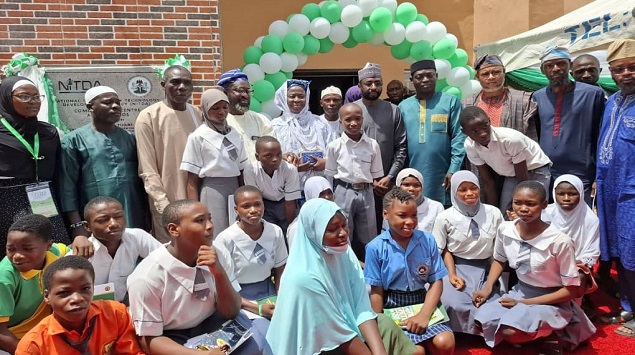General News
Mastercard, Paycode Partner to Increase Access to Financial Services & Govt Assistance for Remote Communities

An estimated 57 percent of the population in Sub Saharan Africa remains financially excluded while close to 30 percent remain without a form of identification and 60 percent of the continent has no internet connectivity, leaving these individuals unable to access government assistance and basic financial services.

To address these challenges, Mastercard has partnered with African fintech and Start Path company Paycode to provide both company’s offerings on one biometric smart card that will help increase access to critical services and advance economic inclusion for Africans living in remote communities.
Mastercard’s Community Pass™ platform will be included in Paycode’s Electronic Data And Payments Technology platform (EDAPT) that currently provides a secure, biometric identity as well as a digital bank account. Individuals can access digital financial services offline in real-time even if they lack a formal identity document such as a birth certificate or passport.
Together, Paycode and Mastercard deliver a path to prosperity, enabling users to manage day-to-day needs including paying school fees for children, getting vaccinations for their families, selling goods, and growing their businesses.
To enable this, Community Pass allows a person’s face or palm to be recognized at both online and offline locations, while ensuring best-in-class security of their individual data. Community Pass also leverages consistent technology standards so that an individual can seamlessly access financial, health, agricultural, or aid services across providers, including government disbursements.
The partnership’s goal is to onboard 30 million individuals living in remote, unconnected areas of Africa over the next three years, enabling them to access the products and services they need with a Community Pass biometric smart card that runs on Paycode’s EDAPT platform.
“Adding Inclusive ID functionality to Paycode biometric smart cards helps reach those currently excluded from critical government programs and ensures we are addressing basic financial needs of a dispersed population,” said Ricardo Pareja, SVP, Sales & Market Development, H&D for Mastercard.
“As we seek to drive beyond inclusion to fostering prosperity in communities across the globe, a critical focus for Mastercard is to help enable the interoperability and scale of solutions like those provided by Paycode.”
Ralph Pecker, ceo at Paycode said: “As Paycode we are proud to partner with global leaders like Mastercard to effect positive change for people on the ground and drive innovation in financial services delivery in deep rural areas.
“As leaders in last mile delivery and proof of life financial services technology, we play the important role of providing solutions that bring tremendous growth and financial access offline in real-time to the financial and technology sectors in Africa.”
“We believe that shared digital tools and scalable channels can drastically improve the reach and access to services, by reducing the cost to serve those communities as well as improving the effectiveness of service delivery.
“At Mastercard, we are committed to building an inclusive, sustainable economy where everyone has the opportunity to reach their potential,” says Selim Ergoz, Vice President, Business Development – Governments at Mastercard.
“Our trusted network powers digital transactions every day, making them safe, simple and smart and we apply this innovation to the most connected and the most remote communities around the world. By partnering with Paycode we will bring Mastercard’s suite of inclusion products to people in Africa that were previously unreachable, and that’s a game changer.”
Last year, Mastercard pledged to connect 1 billion people, including 50 million micro and small businesses, to the digital economy by 2025. As part of these efforts, the technology company has a direct focus on providing 25 million women entrepreneurs with solutions to grow their businesses.
Paycode’s mission is to give biometric identity and affordable access to basic financial services to over 50 million unbanked and underserved people in Africa by 2025.
Across the world, an estimated 3.4 billion people still struggle to meet basic needs such as access to food, life-saving healthcare, and schooling, and small businesses struggle to receive funding. Community Pass was developed as a shared interoperable digital platform designed by Mastercard to address these different needs.
Individuals can be recognized as the same person in different scenarios and make safe, secure, and convenient digital transactions – whether they are receiving healthcare services at a local clinic, checking into a school, or redeeming humanitarian cash aid to purchase goods at a local store.
General News
NOTAP Urges South Eastern Entrepreneurs to Embrace Franchising as Business Model

Dr. Obiageli Amadiobi, director general and chief executive officer, National Office for Technology Acquisition and Promotion (NOTAP), has advocated Franchising as a sustainable business model for the South East entrepreneurs.

Dr. Obiageli Amadiobi, DG/CEO, NOTAP
She made this call during a one-day sensitization and unveiling of the NOTAP Franchising Guidelines for south east stakeholders and entrepreneurs for a successful franchising business.
The DG who was represented at the event by Mr. Emeka Orji, head of Department Corporate Planning (CP) Department, NOTAP, said that franchising business model had globally been proven to be successfully sustainable due to low business risks associated with it.
She defines franchising as a contractual business relationship between a licensor (the franchisor) and a licensee (the franchisee) that allows the business owner to use the licensor’s brand and methods of doing business to distribute products or provide services to consumers.
She added that in essence, the franchisee pays the franchisor for the opportunity to use his established business model and brand name in running his business.
Dr. Amadiobi said the essence of the workshop was not just organised to explore the possibility of adopting franchising as a strategic platform to transform local dreams into national and global business realities.
She described the programme as an opportunity for business owners and intending entrepreneurs from the Zone to latch into the huge and untapped potentials provided by franchising business models in becoming business and brand ambassadors.
With over 800,000 franchise establishments across the globe, generating trillions in revenue, she described Franchising as a pathway to economic empowerment.
General News
FG Launches Online Citizenship, Business Management Portal to Enhance Transparency, Service Delivery
The Federal Government has launched a new Online Citizenship and Business Management Platform, in a bid to boost transparency, operational efficiency, and service delivery. The initiative, unveiled by the Ministry of Interior, is in line with the Renewed Hope Agenda of President Bola Ahmed Tinubu.
![]()
The platform is designed to simplify and accelerate the processing of citizenship and business-related services, allowing individuals and corporate entities to carry out transactions seamlessly from anywhere in the world.
According to a statement issued by Magdalene Ajani, Permanent Secretary of the Ministry, the digital platform represents a significant milestone in the Ministry’s ongoing reform agenda.
It noted that the new system would drastically reduce bureaucratic bottlenecks, enhance user experience, and improve turnaround time for applications. “The Ministry is committed to promoting a more efficient, transparent, and secure framework for citizenship administration.
“This digital transformation is a testament to our resolve to improve public service delivery through the use of technology”, the statement reads.
Members of the public, private organisations, and other stakeholders can now access the platform through the Ministry’s official website: https://interior.gov.ng, or directly via the portal: https://candb.interior.gov.ng. For technical support or inquiries, users can contact: candb-support@interior.gov.ng.
The Ministry emphasised that the launch of this platform is just one of several digital initiatives aimed at transforming the nation’s administrative processes and aligning them with global best practices.
Observers believe the platform could become a game-changer in reducing red tape and promoting a more investor-friendly environment in Nigeria, particularly in areas involving citizenship acquisition and business operations.
General News
NITDA DG says its Community IT Centres Should be a Catalyst of Change

Kashifu Inuwa Abdullahi, director general of National Information Technology Development Agency (NITDA) has said that the 18 community IT centre the agency has built in the past two years are meant to be a beacon of calls and catalyst of change in those communities where they are cited.

He sated this at the commissioning/handing over of IT centre at Akesan area in Lagos. He noted that the IT centres, Innovation hubs among others are part of digital literacy programme of the agency.
“This center is designed and build to help Akesan community to be part of the digital economy, because the President is big and loud when it comes to national prosperity and inclusivity.
“Our target is to build more than 1600 across the country. We want every community every Nigerian to be part of this national prosperity and inclusivity when it comes to digital economy.
“Today, we are here to commission it, to ensure and encourage you to put it in a good use, because we call it a community center means that we want everybody to be part of it. We don’t want it to be suited in a school where the school will lock it for only students and the staff.
“That’s why we located it in the community. Schools can be part of it. Our senior citizens can be part of it. Our religious centers also can be part of it to learn.
“We want it to be a beacon of call as well as a catalyst of change in this community. We want to see more information technology gurus coming from Akesan community. So, I want to encourage you to also come with a sustainability model so that the center will be on. It is on because when you invest in this kind of infrastructure, we don’t want to be called when there are small things that we should come and fix it. That’s why we are handing it over to the community so that the community can put it in a good use. The community can find a way to make it self-sustaining,” he said.
Dr. ‘Bosun Tijani, Honourable Minister of Communications, Innovation & Digital Economy, the NITDA Community Centre in Lagos, a space that is more than just a building. It is a strategic extension of our national mission – a bridge between the Federal Government’s digital economy policies and the unmatched energy, ingenuity, and innovation that Lagos represents.
The minister who was represented by Mr. Johnson Bareyei, director, e-governmance in the ministry, added that his ministry is committed to promoting inclusivity through capacity building initiatives like the 3MTT programme.
“We are also developing the National Digital Economy & e-Governance Bill, which is a robust legislative framework that will help guide our everyday engagement online.
“Our work at the Ministry also includes Project BRIDGE, our ambitious effort to improve interconnectivity by deploying 90,000km of fibre-optic cable across Nigeria. This is a critical imperative as we work towards making Nigeria a $1trillion economy powered by innovation, infrastructure, and inclusive growth,” he said.

 Telecom3 days ago
Telecom3 days ago₦800 Billion Infrastructure Plan Set to Boost MTN’s Network Quality Nationwide

 News3 days ago
News3 days agoCreative Economy Ministry Secures $300M Investments Commitment

 E-Business3 days ago
E-Business3 days agoNITDA, CISCO Empower Youth with Digital Skills

 E-Financial3 days ago
E-Financial3 days agoFidelity Bank reclaims trillion-naira market cap as stock rises to ₦21

 Telecom3 days ago
Telecom3 days agoAfrican Women Hit Hardest as Mobile Internet Gender Gap Persists

 General News3 days ago
General News3 days agoNITDA DG says its Community IT Centres Should be a Catalyst of Change

 Telecom3 days ago
Telecom3 days agoRemita’s Bold Leap: Nigeria’s Fintech Giant Expands Across Africa

 E-Financial3 days ago
E-Financial3 days agoKuda Co-founder Urges Young Developers to Build Tech with Purpose @NACOSS 2025




























